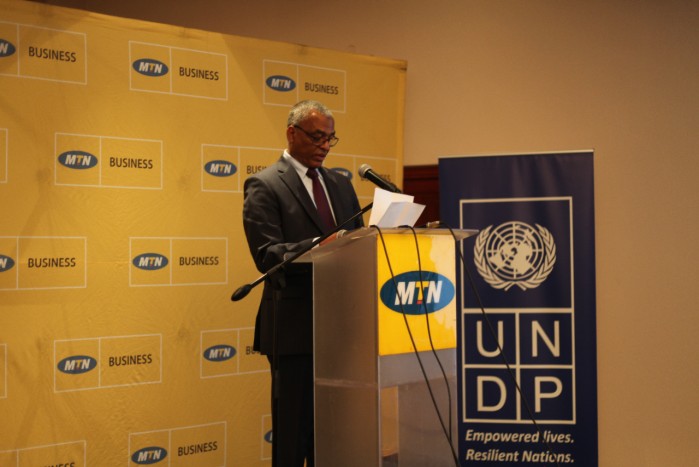
UNDP Resident Representative Israel Dessalegne making his remarks at the launch

The El Niño induced drought has contributed to a projected 64% decrease in production of the small Kingdom of Swaziland’s staple food, maize.

As the world commemorated the International Day for the Preservation of Ozone Layer, Swaziland had more than just the day to celebrate with an environmental milestone of ozone friendly refrigerators manufactured in the Kingdom. This comes after the successful conversion of HCFC 14 1b pre- blended polyol in foam manufacturing to cyclo-pentane initiatives. The country identified that the refrigeration and air-conditioning industry consumes a significant amount of HCFC, which contains large amounts of ozone depleting substance. HCFC do not only deplete the Ozone Layer but are also contributing to emission of Greenhouse Gases responsible for global warming and extreme effects of climate change. This is a project funded by UNDP through the Swaziland Environment Authority (SEA) and was handed over to Palfridge in May. This contributes to the significant reduction of the consumption of ozone depleting substances from 69.6 metric tonnes in 2009 to 18.5 metric tonnes in 2015 for the country as a whole, another milestone noted by the Minister of Tourism and Environment Jabulani Mabuza.

Women face different challenges in society, from economic to social aspects of their lives they are presented with challenges that call for them to develop strategies for a way forward and make an impact in society. Women in Cross Border Trade (WICBT) in Swaziland saw these challenges as an opportunity to develop themselves further. As such, they have formed an apex body known as Sivelesinebunye Women in Cross Border Trade which help them to collectively address issues and challenges faced by the women in this sector. UNDP has facilitated the creation of the apex body for women in informal cross border trade. The apex body known as ‘Sive Lesinebunye Women in Cross Border Trade’ was officially launched

World Water Day is commemorated world over each year on March 22nd, since 1993. The United Nations created this calendar day to magnify the international focus on water related issues and to inspire people and organizations to act to make a positive difference in the lives of others. The Sustainable Development Goals, launched in 2015, include a target to ensure everyone has access to safe water by 2030, making water a key issue in the fight to eradicate extreme poverty. Under the theme “Waste Water”, commemoration of this day was held with different stakeholders working together to support the Government of Swaziland, though the Ministry of Natural Resources and Energy, Department of Water Affairs. These included the United Nations Swaziland (UNICEF and UNDP), Swaziland Water Services Corporation (SWSC), Swaziland Water Development Enterprise (SWADE), Water Aid Swaziland, River Basin Authorities and KOBWA. The commemoration was held on March 30, instead of March 22, 2017. It involved a site visit to a SWSC Waste Water Treatment Plant at Ezulwini, attended by Minister of Natural Resources and Energy, Senator Jabulile Mashwama. Worth noting is that the minister was fresh from attending the Water Indaba in Durban, on invite by her counterpart in South Africa.

As the media is recognized as an important stakeholder in communications including the implementation of the SDG agenda, the main objective of the workshop was to identify the most appropriate approaches in working with media in advancing the SDG National agenda. It was mainly in the form of discussions, group work and simulations aimed to initiate engagement with the media on the SDGs agenda.

In line with facilitating the Landscape approach, which allows for conservation initiatives to go beyond the boundaries of Protected Areas, the Swaziland National Trust Commission through the SNPAS project has developed Land Use and Landscape maps for 31 targeted communities. These maps, which were developed specifically for project and landscape planning purposes, were developed with the full participation of the targeted communities (including community leaders) and relevant stakeholders. These were then presented at a Stakeholders’ Meeting which was attended by representatives of the 31 communities as well as stakeholders from the different government Ministries, relevant parastatals, The University of Swaziland and other public and private institutions, amongst others. These plans had already received and validated them in the individual chiefdoms.

The livelihood of about 40 farmers of rural Mpatheni, under Kontshingila Chiefdom in the Shiselweni Region in the small Kingdom of Swaziland, is largely dependent on growing vegetables for both commercial and subsistence purposes. “Vegetable farming is our life. We are grateful to have received assistance which will go a long way in improving our lives,” one of the farmers, Patricia Mazibuko said.



